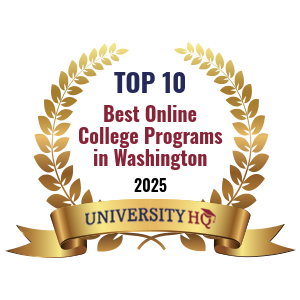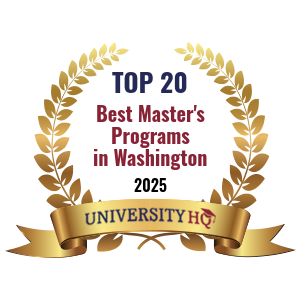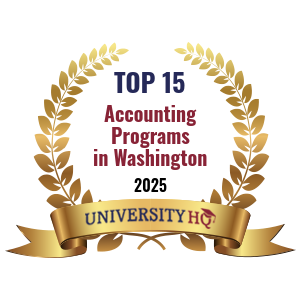Get Matched With Online Colleges
Gonzaga University is a private, not-for-profit university that opened in 1887. It has been instructing students continuously since then. If you attend a traditional, on-campus program, you’ll be living in a mid-size city, Spokane, Washington. Speaking of Spokane, located on the eastern border of Washington State, it is a beautiful city with much to offer residents and visitors.
Search All Programs
Overview of Gonzaga University (GU)
If you love to be in the outdoors, you’ll have many options for places to visit and relax. Should you prefer staying within the boundaries of the city, you have your choice of parks to visit so you can relax, rest or do your homework on sunny, warm days. The Northwest Museum of Arts and Culture is on the west side of the city, as is Riverside State Park.
On the Gonzaga campus, you’ll be able to go to the Foley Center Library so you can study and find the resources you need. If you passed your advanced placement exams, you will be able to request equivalent credits; Gonzaga also accepts dual credits for high school students simultaneously enrolled at the university.
General Information
| School Type | Private not-for-profit |
|---|---|
| Campus Setting | City: Midsize |
| Campus Housing | Yes |
| Student Faculty Ratio | 11:1 |
| Graduation Rate | 86% |
| Year Founded | 1887 |
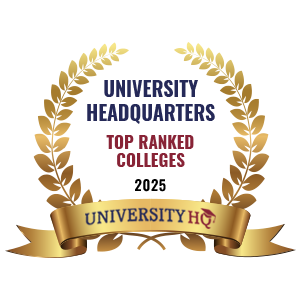
Student Enrollment
Total Students7,563
5,304
2,259
Undergraduate Student
Male 2,493
Female 2,811
Graduate Student
Male 1,062
Female 1,197
Explore Map
Top Rankings For Gonzaga University
Gonzaga Acceptance Rate and Admissions
APPLICATIONS9,311
ACCEPTANCE5,773
Acceptance Rate62%
Enrollment 1,270
| Admissions | |
|---|---|
| Application Fee | $50 |
| High School GPA | Required |
| High School Rank | NA |
| High School Transcripts | Required |
| College Prep Courses | Required |
| Recommendations | Required |
| SAT/ACT | Required |
| TOEFL (Test of English as a Foreign Language) | Required |
| Application Deadline | January 15 |
| Common Application Accepted | Yes |
GU Tuition Cost & Financial Aid
As a private, not-for-profit university, Gonzaga University’s total price is higher than most public schools. This includes tuition, books, supplies, room/board, and other costs. The total price, including all of these, is $52,250.
Students are able to apply for financial aid to bring down the final costs. The price that is left after financial aid has been applied is called the average net price. For Gonzaga University, this was $35,612 for a recent school year. However, this varies depending on the aid you qualify for, usually based on your family income. You can see this broken down below.
- Families who earn up to $30,000 pay around $23,389
- Families who earn between $30,001 and $48,000 pay around $23,111
- Families who earn between $48,001 and $75,000 pay around $28,186
- Families who earn between $75,001 and $110,000 pay around $35,416
- Families earning more than $110,000 pay around $38,860
As a freshman, you should definitely apply for financial aid if you parents can’t cover the whole cost. In a recent year, the whole freshman class received financial aid, in grants and scholarships averaging $21,554. Many also applied for institutional grants and scholarships, an received an average of $20,491. Institutional grants and scholarships are financial aid coming from the university, not the federal or state government.
| Average net price | 2017-2018 |
|---|---|
| Net Price | $35,612 |
| Average Total Aid | $21,554 |
| Students Receiving Financial Aid | 100% |
| Room & Board | $12,330 |
Sticker Price
- Tuition In-State - $45,140
- Tuition Out-of-State - $45,140
- Books and Supplies - $1,158
- Room & Board - $12,330
- Other - $3,622
Academics
You may have heard about retention rates as you considered different schools. The retention rate is the percentage of first-time students who return for their second year of school. For Gonzaga, this is an excellent 94%. This is usually considered a good sign that students who attend in their freshman year appreciate the education and environment the school offers.
The 4-year graduation rate for students at Gonzaga is 73%. The 6-year graduation rate is slightly higher, at 86%. Some students’ degree programs may be so challenging they need the extra two years. The student-to-faculty ratio just indicates how many students are in classes and vying for professor’s open office time. This is fairly low at 11 to 1, meaning you should have no trouble finding help if you need it. Gonzaga is a smaller university with a total student population of 7,563. The undergraduate class numbers 5,304 and the graduate class has 2,259 students.
You won’t be able to take evening classes if you have to work during the day. But you can sign up for individual online classes; if the class you need conflicts with work hours or even another class on your schedule, an online class allows you to take it when you aren’t working.
If you’re still thinking about what to major in, you’re in good company. Most freshmen haven’t decided what their final major will be, which is why it’s good to attend a school that has plenty of options that interest you. Explore your options and see which degree programs interest you the most. Majors offered include biological and biomedical sciences, business and related services, communication and journalism, education, engineering, health professions, and legal professions. At the graduate level they offer psychology and social sciences.
Retention
Rate
4 year
Graduation
Rate
6 year
Graduation
Rate
Student Population Total
Student Population 7,563
5,304
2,259
Most Popular Programs & Majors
(# of Diplomas Awarded by Subject)
| All Business Majors | 366 Total Graduates / 28 |
|---|---|
| Business/Commerce, General | 284 Graduates |
| Accounting | 82 Graduates |
| All Engineering Majors | 172 Total Graduates / 13% |
| Mechanical Engineering | 84 Graduates |
| Civil Engineering, General | 45 Graduates |
| Electrical and Electronics Engineering | 28 Graduates |
| Engineering, General | 15 Graduates |
| All Biological & Biomedical Majors | 145 Total Graduates / 11% |
| Biology/Biological Sciences, General | 82 Graduates |
| Exercise Physiology | 49 Graduates |
| Biochemistry | 14 Graduates |
| All Social Sciences Majors | 128 Total Graduates / 10% |
| Economics, General | 33 Graduates |
| Sociology | 32 Graduates |
| Political Science and Government, General | 29 Graduates |
| Criminology | 18 Graduates |
| International Relations and Affairs | 16 Graduates |
| Communication, Journalism, and Related Programs | 85 Total Graduates / 7% |
| Public Relations, Advertising, and Applied Communication, Other | 34 Graduates |
| Speech Communication and Rhetoric | 29 Graduates |
| Broadcast Journalism | 12 Graduates |
| Journalism | 10 Graduates |
| All Other Diplomas | 30% |
Outcome & Salary
When you graduate from Gonzaga, you have a degree that offers you a good return on investment. Graduate’s early salary averages $59,100 and their mid-career salary is closer to $115,000.
The average cost of four years of education at this university is $142,448. With a 10-year salary potential of $680,000 and a 20-year salary earning potential of $1,830,000, it’s easy to see how you could benefit financially from this education. Graduate’s return on investment (ROI) at 10 years is $537,552 and their 20-year projected ROI is $1,687,552.
High school graduates who don’t attend college earn a national average salary of $37,960. Their 10-year projected income is $379,600 and their 20-year projected income is $759,200.
| Graduates Salary | |
|---|---|
| College Grads Early Career Salary | $59,100 |
| College Grads Average Salary | $68,000 |
| College Grads Mid Career Salary | $115,000 |
| Return on Investment (ROI) | |
|---|---|
| 10 Year Salary Earnings Potential | $680,000 |
| 20 Year Salary Earnings Potential | $1,830,000 |
| Cost of Education (Net Price) 4 Year | $142,448 |
| 10 Year Projected ROI | $537,552 |
| 20 Year Projected ROI | $1,687,552 |
| No College Education Salary Comparison | |
|---|---|
| National Average Salary | $38,792 |
| 10 Year Projected Income | $387,920 |
| 20 Year Projected Income | $775,840 |
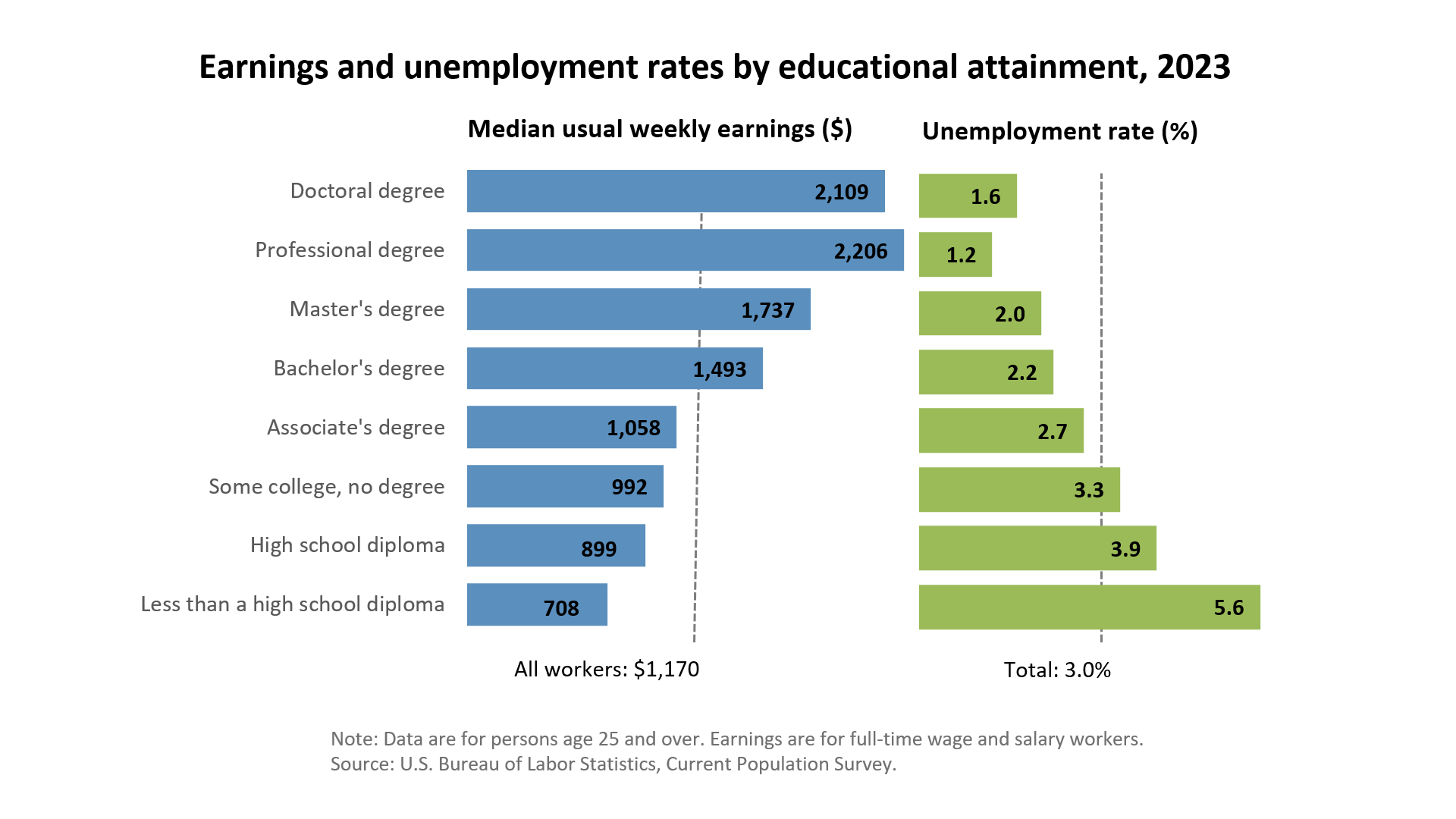
Photos & Videos
sources:
Related Top College Resources


